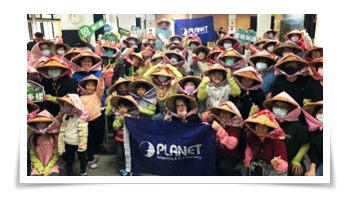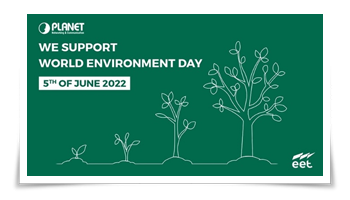Environmental Sustainability
PLANET attaches great importance to the implementation of green energy, carbon reduction and environmental protection policies in its R&D and production. Environmental sustainability has been incorporated into the company’s management system with the setting of short-, medium- and long-term goals for environmental sustainability. PLANET strives to track the latest developments in environmental issues such as energy and climate change, improvement on energy efficiency and elimination of polluting emissions, pursuing its goal of “2050 Net Zero Carbon Emissions”.
PLANET’s Environmental Sustainability Goals
In the face of global climate change and environmental issues, while maintaining the Earth's temperature rise not exceeding 1.5 ℃, maintaining the environment and biodiversity and paying attention to the enterprise growth risks and potential market opportunities, PLANET implements climate and environmental actions, systematically practices forward-looking management and sets short-term, medium-term and long-term environmental sustainability goals.

Key Milestones in PLANET's Climate and Environmental Actions

Climate and Nature-related Information Disclosure
PLANET actively responds to the risks associated with climate and natural change, seizes the opportunities obtained in the process of transforming into a low-carbon economy and effectively allocates resources to enhance the competitiveness and operational resilience of the enterprise. To clearly present the impact of climate and nature-related changes on the Company, PLANET identifies environmental and climate risks and opportunities based on the frameworks of the Taskforce on Nature-Related Financial Disclosures (TNFD) and the Task Force on Climate-related Financial Disclosures (TCFD).
Please refer to the 2024 PLANET Climate and Natural Report.
In 2023, PLANET participated in the Carbon Disclosure Project (CDP) for the first time and received a grade of C (Awareness Level). In 2024, the Company made significant progress, achieving a grade of B (Management Level), which is the highest score in the 2024 CDP assessment designed for SMEs worldwide, demonstrating its continuous improvement in carbon management and sustainable development. Through the CDP evaluation questionnaire, the Company disclosed its carbon emissions inventory, carbon reduction performance, and conducted an in-depth identification of regulatory and physical risks to enhance its climate resilience. Furthermore, PLANET assessed issues such as energy depletion, resource shortages, extreme weather events, and rising sea levels to reduce operational risks and costs, further transforming risks into opportunities for green circular economy development and enhancing sustainable corporate competitiveness.

Climate Change Management
In response to international trends and policy frameworks, PLANET is promoting the PLANET 2050 Net-Zero Carbon Emissions Roadmap and implementing four core strategies, including "GHG management", "green product development", "environmental impact mitigation" and "sustainable environmental management mechanisms" to achieve the goal of 2050 Net Zero and adapt and mitigate the impacts of climate change in addition to setting short-term, medium-term and long-term environmental sustainability goals.



◾ Greenhouse Gas Inventory
PLANET sets organizational boundaries based on the operational control method by referring to the ISO 14064-1 standards, and sets the base year as 2022. The main greenhouse gas emissions include carbon dioxide (CO2), methane (CH4) and hydrofluorocarbons (HFCs). The Company has achieved the ISO 14064-1 verification for three consecutive years since 2023.
The differences in emissions between 2024 and 2023 are described as follows:
- Category 1: Direct GHG emissions totaled 48.7637 metric tons CO2e in 2024, an increase of 7.36% compared to 2023. The primary reason for this increase was a higher volume of fuel consumption for company vehicles.
- Category 2: Indirect GHG emissions (market-based) amounted to 262.9618 metric tons CO2e in 2024, reflecting a 5.4% decrease from 2023. This reduction was mainly due to a higher proportion of renewable energy usage.
- Categories 3–4: Other indirect GHG emissions reached 913.8986 metric tons CO2e in 2024, marking a 77.6% increase compared to 2023. The rise was primarily due to the expansion of the upstream and downstream transportation assessment scope and the inclusion of assessment of employee commuting.
◾ Results of PLANET's Greenhouse Gas Emission Inventory in the Past Three Years
| Year | 2022 | 2023 | 2024 | |||
|---|---|---|---|---|---|---|
| Inventory scope | 5th to 11th floors and 2nd floor, No. 96 and B1 No. 96, B1 No. 98 and B1 No. 100 Minquan Road, Xindian District, New Taipei City | 5th to 11th floors and 2nd floor, No. 96 and B1 No. 96, B1 No. 98 and B1 No. 100 Minquan Road, Xindian District, New Taipei City | 5th to 11th floors and 2nd floor, No. 96 and B1 No. 96, B1 No. 98 and B1 No. 100 Minquan Road, Xindian District, New Taipei City | |||
| Category 1: Direct Emissions | 41.5048 | 45.4190 | 48.7637 | |||
| Category 2: Energy Indirect Emissions | Region-based | Market-based | Region-based | Market-based | Region-based | Market-based |
| 342.8955 | 328.1345 | 321.8921 | 277.9747 | 343.2106 | 262.9618 | |
| Categories 3–4: Other Indirect Emissions | 136.2802 | 514.4390 | 913.8986 | |||
- The data on GHG inventory for 2022 and 2024 was verified by a third-party organization
- The Global Warming Potential (GWP) is based on the IPCC Sixth Assessment Report (2021)
- PLANET operates primarily in an office-based environment, with no use of ozone-depleting substances and no emissions of nitrogen oxides (NOx) or sulfur oxides (SOx).
Considering business development and production capacity impact, PLANET explains the correlation between production capacity scale and emissions based on the intensity of GHG emissions to realistically reflect the impact of changes in production capacity specifications on GHG emissions and reduction target achievement rates.
The GHG emissions intensity of PLANET in the past three years has shown a downward trend. In 2024, the GHG emissions intensity was 0.1658 metric tons of CO2e per NT$ million, a decrease of 5.4% compared to 2023.

◾ The Use of Renewable Energy Exceeds Phase Target
The use of renewable energy is one of the key strategies for PLANET to accomplish the goal of 2050 Net-Zero Carbon Emissions. In 2020, PLANET began laying the groundwork for renewable energy adoption by signing a memorandum of understanding with a green power provider. In 2021, the Company formalized its commitment by signing a Renewable Energy Power and Certificate Purchase Agreement. In 2022, PLANET joined the "Climate Declaration" RE10x10 initiative, pledging to use at least 10% green power in its total power consumption by 2025. In July of the same year, PLANET officially began using green power.
In 2023, PLANET achieved a green power usage rate of 13.6%, meeting the RE10 target ahead of schedule. In 2024, PLANET used a total of 162,447 kWh of green power, accounting for 23.4% of the Company’s total electricity consumption, which also exceeded the RE 20 target, and reducing carbon emissions by 80.2488 metric tons of CO2e. The Company has obtained 98 Renewable Energy Certificates (RECs).
◾ Green Product Design and Renewable Energy Network Product Development
With its emphasis on the R&D of eco-friendly product design, PLANET set standards to developing products with “green” design, from technical development, sourcing, manufacturing, product use, transporting and recycling.
PLANET is the first brand to integrate renewable energy and Ethernet transmission technology. Its Renewable Energy network product series is designed for off-grid renewable energy applications in natural reserves or remote areas. As the power of the network infrastructure comes from renewable energy sources like solar power, wind power or hydro power, there is no need for utility power, thus helping the CO2 emissions and limiting global warming and climate changes. More information.
◾ Sustainable Value Chain
PLANET is committed to building a sustainable, low-carbon supply chain. Through our Green Supply Chain Management Platform, we collaborate with suppliers on green products, materials, carbon inventory, and carbon footprint tracking, thus enhancing resilience with digital tools and net-zero strategies. By the end of 2024, 31% of our 191 suppliers had completed greenhouse gas inventories, and 21% were verified under ISO 14064-1 standards.
We also launched the “Supply Chain Sustainability Resilience Cloud Project,” supported by a Ministry of Economic Affairs decarbonization subsidy, helping 11 suppliers advance carbon management and low-carbon transformation. To reduce logistics emissions, PLANET partners with DHL’s GoGreen Plus service, using sustainable aviation fuel on major routes, including the U.S. and Europe. This initiative cut 15.5 metric tons of CO₂e in 2023 (5%) and 26.6 metric tons in 2024 (11%), with third-party verification by SGS. We continue to support suppliers through online training and resources, working together to build a greener, more resilient supply chain for the future.
◾ Nature Positive – Biodiversity and Nature Conservation
PLANET’s office buildings and primary manufacturing sites are not located in environmentally protected areas, regions of high biodiversity, or rehabilitated habitats. PLANET upholds a sustainability philosophy centered on natural restoration and ecosystem regeneration, striving to promote the positive development of the natural environment. The Company continues to collaborate with local communities and stakeholders in the implementation of ecological conservation projects, aiming not only to reduce negative environmental impacts but also to enhance the positive benefits to ecosys
PLANET is committed to mitigating its impact on the ecological environment through continuous improvement of its activities, products, and services, while promoting biodiversity conservation and reforestation initiatives. The Company is systematically introducing Nature-based Solutions (NbS) to achieve the shared goals of No Net Loss and Net Positive Impact.

【Natural Ecological Restoration】
Over a decade ago, the founder of PLANET Technology, recognizing the vital interdependence between living organisms and the natural environment, began searching for a location to support ecological restoration. This search ultimately led to the discovery of a water source at the confluence of two streams in the Wanli area. With its rich natural resources and diverse ecological environment, this site was developed into the Wanli Ecological Park under the philosophy of "coexistence of all beings and harmony with nature".
Before PLANET taking over the site, this site was developed for commercial purposes and was filled with artificial landscaping. PLANET decided to implement ecological engineering methods to transform the area, including extensively planted native grasses, flowers, and trees, built ecological ponds and launched a Firefly Restoration Program. These efforts have created a harmonious environment where nature and humanity coexist, enabling the ecosystem to regain balance and evolve into a self-sustaining natural habitat.

【Clean air, Clear mind action to reduce air pollution, reduce carbon emissions and enhance biodiversity】
PLANET has long been concerned about the impact of climate change on the Earth's environment, such as the extreme climate and ecological imbalance caused by the greenhouse effect. The company, in liaison with International Nature Restoration Action Association (INRAA), launched the “Clean air, Clear mind action” program, which encouraged the use of rice straw decomposing bacteria to reduce carbon emissions from burning rice straws and protect public health. Another benefit of the method is that rice straw waste can be decomposed and recycled on site, and organic substances in the soil can be increased to facilitate biodiversity.
PLANET caused rice straws to be stopped burning through the "Clean air, Clear mind action" initiative to reduce air pollution, reduce carbon emissions and enhance biodiversity. In response to the 4 Per 1000 initiative, PLANET officially became a member of the initiative in May 2023, continuing to contribute to soil health, food security and climate change. Click to the list of members and partners of the “4 per 1000” Initiative

【Cultivation of Pinglin Organic Tea Gardens to Protect Water Sources, Reduce Carbon Emissions and Enhance Biodiversity】
As PLANET’s production processes do not involve use of water, the company takes ecological water resources protection as the direction of its sustainable water resources management works. Since 2010, PLANET has been working with Tse-Xin Organic Agriculture Foundation.

【World Environment Day - Tree Planting to Increase Forest Carbon Sinks and Enhance Biodiversity】
Since 2022, PLANET has joined hands with its customers to conduct a meaningful green tree-planting initiative to mark World Environment Day. From 2022 to 2024, a total of 26,000 trees have been planted across Madagascar and Kenya. This proactive effort aims not only to mitigate the threats of climate change but also to actively promote biodiversity conservation, demonstrating PLANET's commitment to global ecological balance. The sustainable partnership project contributes
to the restoration of local ecosystems and reflects the Company's long-term dedication to environmental stewardship.